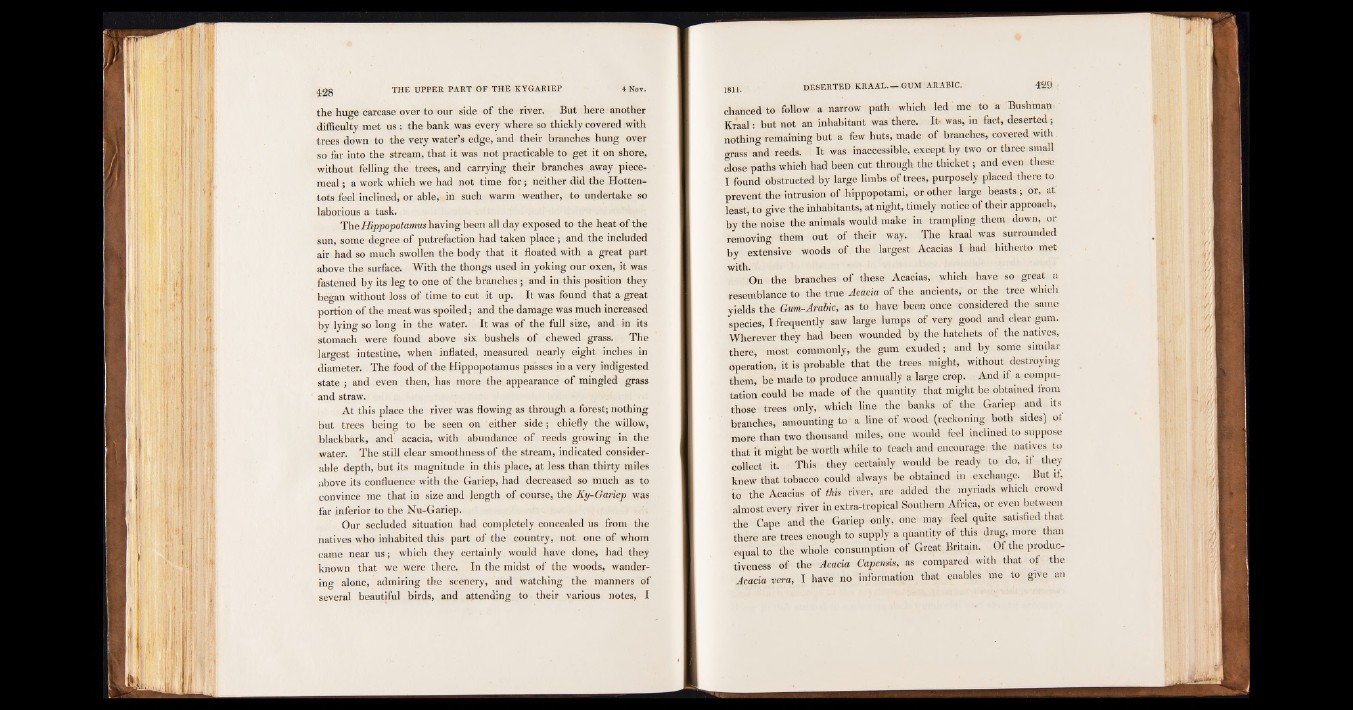
the huge carcase over to our side of the river. But here another
difficulty met us : the bank was every where so thickly covered with
trees down to the very water’s edge, and their branches hung over
so far into the stream, that it was not practicable to get it on shore,
without felling the trees, and carrying their branches away piecemeal
; a work which we had not time for; neither did the Hottentots
feel inclined, or able, in such warm weather, to undertake so
laborious a task.
The Hippopotamus having been all day exposed to the heat of the
sun, some degree of putrefaction had taken place; and the included
air had so much swollen the body that it floated with a great part
above the surface. With the thongs used in yoking our oxen, it was
fastened by its leg to one of the branches; and in this position they
began without loss of time to cut it up. It was found that a great
portion of the meat was spoiled; and the damage was much increased
by lying so long in the water. It was of the full size, and in its
stomach were found above six bushels of chewed grass. The
largest intestine, when inflated, measured nearly eight inches in
diameter. The food of the Hippopotamus passes ¡n a very indigested
state ; and even then, has more the appearance of mingled grass
and straw.
At this place the river was flowing as through a forest; nothing
but trees being to be seen on either side; chiefly the willow,
blackbark, and acacia, with abundance of reeds growing in the
water. The still clear smoothness of the stream, indicated considerable
depth, but its magnitude in this place, at less than thirty miles
above its confluence with the Gariep, had decreased so much as to
convince me that in size and length of course, the Ky-Gariep was
far inferior to the Nu-Gariep.
Our secluded situation had completely concealed us from the
natives who inhabited this part of the country, not one of whom
came near u s ; which they certainly would have done, had they
known that we. were there. In the midst of the woods, wandering
alone, admiring the scenery, and watching the manners of
several beautiful birds, and attending to their various notes, I
chanced to follow a narrow path which led me to a Bushman:
Kraal: but not an inhabitant was there. It* was, in fact, deserted;
nothing remaining but a few huts, made of branches, covered with
grass and reeds. It was inaccessible, except by two or three small
close paths which had been cut through the thicket; and even these
I found obstructed by large limbs of trees, purposely placed there to
prevent the intrusion of hippopotami, or other large beasts; or, at
least, to give the inhabitants, at night, timely notice of their approach,
by the noise the animals would make in trampling them down, or
removing them out of their way. The kraal was surrounded
by extensive woods of the largest Acacias I had hitherto met
with.
On the branches of these Acacias, which have so great a
resemblance to the true Acacia of the ancients, or the tree which
yields the Gum-Arabic, as to have been once considered the same
species, I frequently saw large lumps of very good and clear gum.
Wherever they had been wounded by the hatchets of the natives,
there, most commonly, the gum exuded; and by some similar
operation, it is probable that the trees might, without destroying
them, be made to produce annually a large crop. And if a computation
could be made of the quantity that might be obtained ironi
those trees only, which line the banks of the Gariep and its
branches, amounting to a line of wood (reckoning both sides) ot
more than two thousand miles, one would feel inclined to suppose
that it might be worth while to teach and encourage the natives to
collect it. This they certainly would be ready to do, if they
knew that tobacco could always be obtained in exchange. But if,
to the Acacias of this river, are added the myriads which crowd
almost every river in extra-tropical Southern Africa, or even between
the Cape and the Gariep only, one may feel quite satisfied that
there are trees enough to supply a quantity of this drug, more than
equal to the whole consumption of Great Britain. Of the productiveness
of the Acacia Capenm, as compared with that of the
Acacia vera, I have no information that enables me to give an